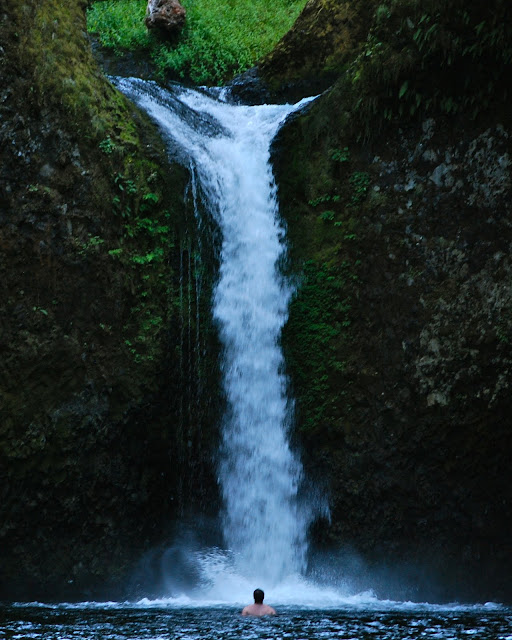It's been a long time since we've seen one of these, hasn't it? I wrote it on the plane between Detroit and Oakland. I hope this means I'll start getting into writing more short stories again but only time will tell.
1336 words
Learning to Purr
It was on an ordinary summer afternoon, hot enough to melt us into the big living room chair before we realized it, when I clearly heard the cat talk. She was lying in my lap and I was absentmindedly brushing her ash grey hairs into clumps that would ball up at her tail then launch lazily into the stale air and float to the ground, shining a brilliant gold for a brief moment as they fell through the window light. We had existed, nothing more than existed, this way for who knows how long – an unwatched half hour in summer’s heat can be in reality either a couple minutes or an entire afternoon – and the cat purred sleepily into my side until suddenly but expectedly she looked up to me with sad and curious eyes and spoke: “How come you never purr when you stroke me?”
Her mouth didn’t move, yet her speaking was the most natural occurrence in the world. She used a voice so familiar that it would be impossible to describe, so commonplace that it defies characteristics, like that of a friend you’ve spent your life with. It was the universal voice, I have come to realize after years of pondering our conversation, of summer. I moved my eyes from a puff of floating grey hair to my cat without turning my head and saw her relaxed, troubled disposition, her question fading in the air like a question asked from one sleepy lover to another at the crack of dawn.
“It’s not how I express enjoyment,” I murmured.
“Ah, but you do enjoy it, don’t you?” she cooed, her mouth still not moving, the upside-down V still frowning under her nose. “When you stroke me, I mean. You know I find it incredible.”
I nodded with slow movements.
“Sometimes I can’t tell,” the cat went on. Her head flopped back onto my thigh. “You never purr. Sometimes I feel like you’re only doing it to humor me.”
I said, “No.”
“Because I do want you to be happy,” she said with sudden intensity, lifting her head and pointing her ears up with ferocity. “I wish I could make you purr, oh, I wish it! What can I do?”
“There’s nothing,” I replied. “I don’t purr. It’s not my thing.”
“So how can I know if you’re enjoying yourself?” Her ears drooped ever so slightly, yet giving the unmistakable air of immense disappointment.
“I do enjoy it,” I said. “Believe me. I wouldn’t pet you at all if I didn’t like to. And besides,” I added as I straightened out my back a bit, “you know by now that we’re very different creatures. I express enjoyment differently. Cats purr. I smile or laugh or sigh, or sometimes I just say it.”
The cat thought this over for a moment, watching a tuft of hair turn gold in the window light. “You do smile as you stroke me,” she said to herself. She snapped her head back up at me. “But every night before you go to bed, your wife tells you she loves you and you repeat it back to her. Word for word, ‘I love you.’ Like a parrot.”
I smiled at her, partly on purpose. “So when you purr it means you love me?”
“Yes!” she exclaimed with exasperation. “Do you know how awful it feels to hear nothing back when I say something like that?”
“Well, I do love you.”
She shook her head. “Words are so emotionless,” she lamented, staring out the window. Outside on a tri-legged black wire stand stood the orchid I’d bought my wife for our anniversary, two long green stalks curling at the top into yellow petals on either side of a bulb that looked like dragon lips. Sunlight filtered through the trees and passed through the orchid’s petals so we could clearly see the deep red veins inside. Beyond the orchid was the eternal front porch, beyond it the patchy, weed-covered lawn littered in patches by the neighbors’ kids’ candy wrappers and their dog’s shit; beyond that the sidewalk, heat oozing out of it, making the concrete shudder before my eyes; beyond that the car – the black one my wife refused to drive in the hot summer; beyond that the street, beyond that the neighborhood; beyond that the city; and beyond that the future. “You can’t even describe sun coming through a flower petal with words,” said the cat. “Try it. There’s no emotion when you put words to it. Words muddle up what’s in front of us. People can talk about two completely different things without realizing it. But with a purr there’s no question. When a cat purrs you know for certain she’s unequivocally happier than anything.”
“It’s not that I prefer words,” I interrupted, still looking out at the orchid. “I can’t purr. It’s not the way my body works.”
“Oh, it’s not hard,” said the cat carelessly. “Physically, that is. You just make a little tremor in your voice box by bouncing air around it as you breathe in and out.”
“Bouncing air around it?”
“Like a rubber ball.”
“That doesn’t sound easy.”
She rolled her eyes. “That’s because I used words. The purr has to come from your belly for it to mean anything at all. If you really feel it then it’s easier than walking.”
I gave it a try, but the noise sounded more like a growl than a purr. I could tell the cat was trying not to look hurt.
“It’s because you don’t feel it,” she said. “You don’t like stroking me and you don’t love me.”
The cat never spoke again. Two months later she died. A drunken teenager whipped down the street with his parents’ SUV in the middle of the night and flattened her. There was barely anything left; I couldn’t look so I can’t say what she looked like. My wife tells me the head was completely separated from the body. She knew about the conversation I’d had with the cat, and of course she didn’t believe it. I couldn’t believe it myself once the heat of summer started to die down and on came the first rains and cool structure of a fully acclimated new teaching schedule – especially because the cat acted as if nothing had changed between us. She still fell into my lap when I sat on the big living room chair, she still purred, she still nested her wet nose into my side, her grey hair still clumped up and turned golden in the window light.
Yet after she died, I felt more and more certain that our conversation really did take place. I had indeed tried and failed to purr for my cat and she couldn’t hide her heartbreak at my failure. As time passed following her death I began to believe what she said was true: I didn’t love her. I hadn’t looked at the carcass and I hadn’t cried. I also didn’t feel loss but instead overwhelming gain and responsibility. I plunged into the world of my students and class work without having a chance to retreat into personal sanity. In losing our aimless half-hours together I gained tension and focus. In losing her warmth on my lap I gained a new cold determination that neither satisfied nor disappointed. I was snapped back into the rigors of daily life with nowhere to retreat, like a lover fully awake and prepared, yet ferociously longing for the warm blankets as if clinging to a precious fading memory. The cat faded into my memory: her voice so natural sounding on the day of our conversation now utterly impossible to recall, her grey hair only ashen as a word, her purr only a tremor. The memory had nearly gone before I realized its importance, only after I had begun to notice how passionlessly I was saying “I love you” to my wife each night and how there was no unequivocal tremor rumbling inside me to better communicate that precious message.



































